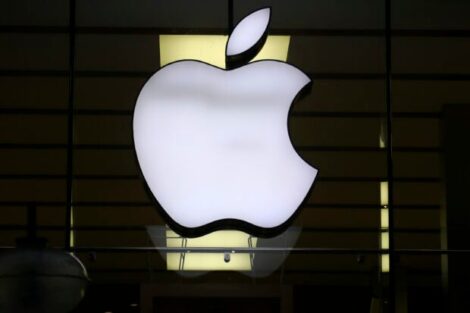
The Apple logo is illuminated at a store in the city center of Munich, Germany, Dec. 16, 2020. (AP Photo/Matthias Schrader, File)
Apple is expected to take the wraps off its next iPhone on Tuesday during what has become an annual late summer rite aimed at giving more people more reasons to buy the technology trendsetter’s marquee product.
The showcase at Apple’s Cupertino California, headquarters comes as the company is mired in a mild slump that has seen its sales drop from last year in three consecutive quarters — with management signaling another downturn is likely during the current quarter that will be capped with the release of its iPhone 15 lineup.
The malaise is a key reason Apple’s stock price has dipped by nearly 10 percent since mid-July, dropping the company’s market value below the $3 trillion threshold it reached for the first time earlier this summer.
As has been case with Apple and other smartphone makers, the next model isn’t expected to make any major leaps in technology. The array of iPhone 15 choices, likely to range from lower-priced basic models to more expensive premium versions, are expected to consist of mostly incremental advances to the device’s chips, battery and cameras.
The basic iPhone 15 models also may be redesigned to include a shape-shifting cutout on the display screen that Apple calls its “Dynamic Island” for app notifications — a look that was introduced with last year’s Pro and Pro Max devices.
If the rumor mill pans out, this year’s iPhone 15 Pro and Pro Max may feature a periscope-style telephoto lens that will improve the quality of photos taken from far distances. The telephoto lens could boast a 6x optical zoom, which would still lag the 10x optical zoom on Samsung’s premium Galaxy S22 Ultra, but would be a significant upgrade from the 3x optical zoom on the iPhone 14 Pro and Pro Max.
The improved camera is one of the reasons Apple is also expected to raise the prices of the Pro and Pro Max. The iPhone 14 Pro starts at $1,000 while the Pro Max starts at $1,100.
Analysts think the iPhone 15 versions of those models may cost an additional $100 to $200, testing how much consumers are willing to pay for the devices at a time when post-pandemic inflation has been squeezing more household budgets.
One of the biggest anticipated changes that Apple is expected to announce is a new way to charge the iPhone 15 models and future generations. The company is expected to switch to the USB-C cable standard that is already widely used on many devices, including its Mac computers and many of its iPads.
Apple is being forced to start phasing out the Lightning port cables that it rolled out in 2012 with the release of the iPhone 5 because of a mandate that European regulators are imposing in 2024. It’s unclear whether Apple will initially limit the switchover to USB-C ports to models made specifically for the European market or make the change worldwide.
If Apple decides it’s time to move away from Lightning port cables throughout the world, the transition may not be too inconvenient for most consumers. That’s because USB-C cables already are so widely used on a range of computers, smartphones and other devices that many people may already own them. The shift to USB-C cables may even be a popular move since that standard typically charges devices more quickly and also offers faster speeds for data transfers.
Besides its new iPhones, Apple also typically uses this annual showcase to unveil its next generation of smartwatches — a product that made its debut nearly a decade ago. The arrival of the new iPhones also sets the stage for the next version of the software that powers the device.
That operating system, iOS 17, will be available as a free download to previous generations later this month and will include new features such as the ability to read a transcription of a message being left on an unanswered call in real time with an option of deciding to talk to the person on the line before the voicemail is finished.